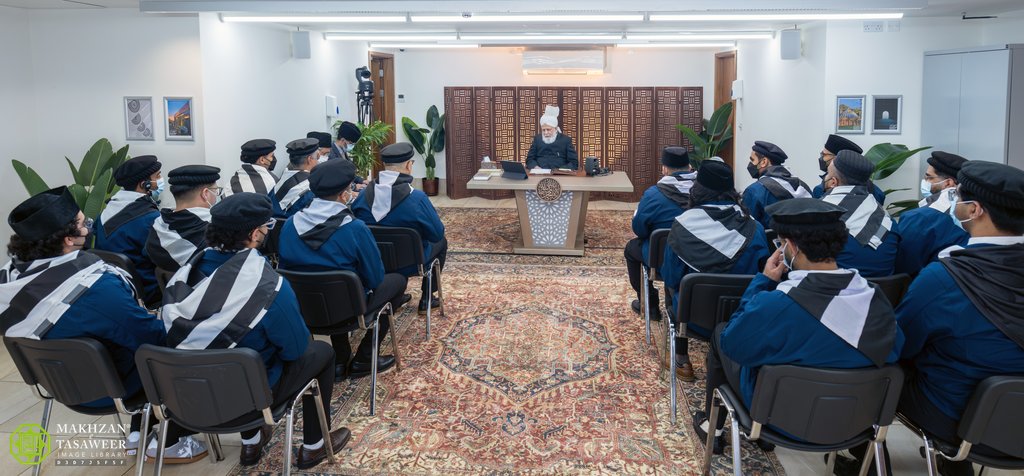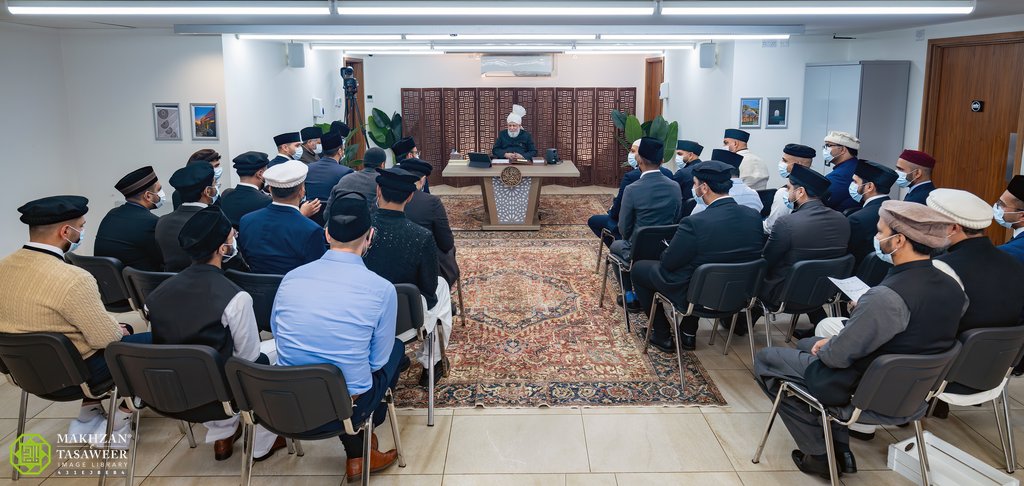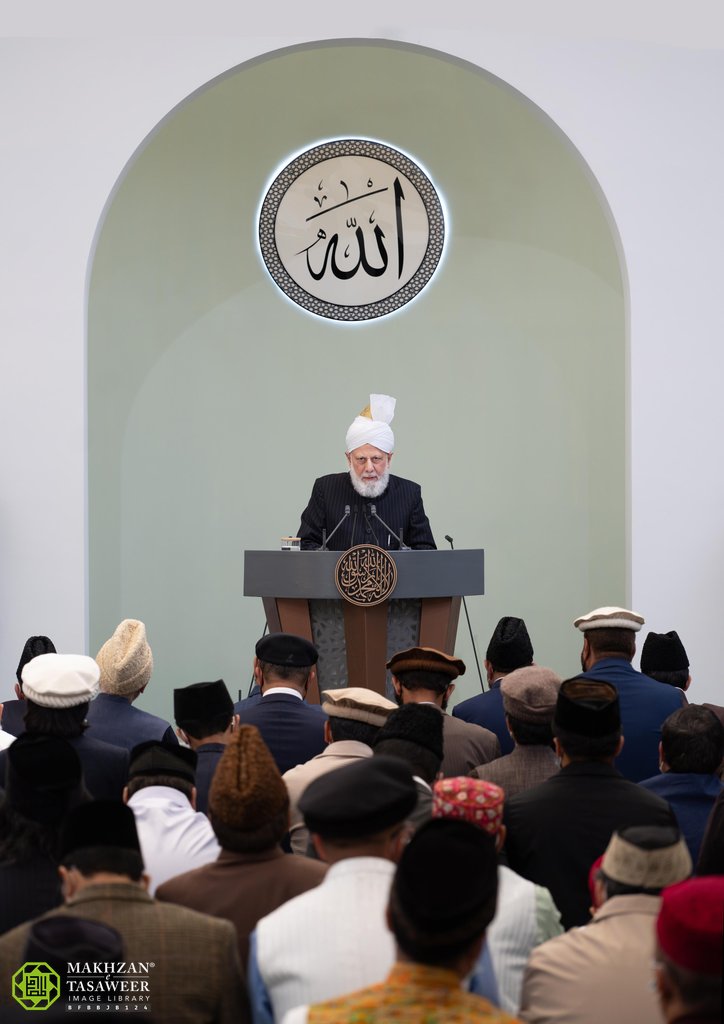
Members of Muqami Region, USA Have Honour of Meeting Hazrat Mirza Masroor Ahmad
“Allah the Almighty has said in the Holy Qur’an that you must strive in His path. Strive, make an effort, strive hard, and then He will grant you success.” – Hazrat Mirza Masroor Ahmad
On 17 November 2025, the Worldwide Head of the Ahmadiyya Muslim Community, His Holiness Hazrat Mirza Masroor Ahmad, the Fifth Khalifa (Caliph), granted an audience to a delegation of sixteen members of Majlis Khuddamul Ahmadiyya USA, who had travelled from Muqami Region (Maryland), for the opportunity to meet His Holiness.
Majlis Khuddamul Ahmadiyya, the Ahmadiyya Muslim Youth Association, is an auxiliary organisation dedicated to the moral and spiritual development of the male youth within the Community.
During the audience, each attendee had the opportunity to personally greet His Holiness and introduce themselves. Following the introductions, members put forward questions seeking His Holiness’ guidance on issues that were impacting the youth of today.
One attendee asked His Holiness how young people can develop true spiritual patience required to strive in the way of Allah, particularly in an age dominated by instant gratification, and how they can better prepare themselves for the hereafter.
Hazrat Mirza Masroor Ahmad stated:
“When one climbs a ladder, one must take the first step; you do not jump straight onto the final step. You must climb each step one by one; otherwise, if you try to leap forward, you will fall. The same is the case with spiritual rank. When you try to ascend and say all at once, “I will offer two prayers and become a saint of God,” this is not how it happens.
Allah the Almighty has said in the Holy Qur’an that you must strive in His path. Strive, make an effort, strive hard, and then He will grant you success.
Therefore, just as we exert ourselves in worldly matters, we must exert ourselves in religious matters. One does not find Allah in a single day. Allah says, “Strive in My path.” That you worship Allah, and offer your five daily prayers properly.
Then [ensure that you] offer voluntary prayers; engage in the remembrance of Allah; practise the commandments contained in the Holy Qur’an. Are you fulfilling the rights of people, or not? Are you fulfilling the rights of Allah, or not? When all these things are fulfilled, then if one desires spiritual progress, a connection with Allah is established.
Just as you exercise patience from primary school all the way to a Bachelor’s degree – fourteen or fifteen years – likewise you must show patience here and learn. Offering four prayers here and there, and then praying five times a day for thirty days in Ramadan, and saying, “We have prayed a lot, but we have not seen Allah” – Allah does not become visible in one month. In those very verses of fasting and Ramadan, Allah says that you must become firm in faith and obey His commandments; then He will listen to your prayers.”
Another attendee asked His Holiness whether those who have passed away are able to hear or witness the emotions and prayers of the loved ones they leave behind. Before responding, His Holiness explained that such matters have been addressed by the Promised Messiah (peace be upon him) in his book The Philosophy of the Teachings of Islam.
Thereafter, Hazrat Mirza Masroor Ahmad stated:
“After death, the soul separates from the body. It ascends to the heavens, to God. There, Allah grants it a new body. That new body is not like this physical body… Those destined for Paradise will enjoy its blessings. The Promised Messiah has explained these matters in detail in The Philosophy of the Teachings of Islam… Allah also informs them that their loved ones are praying for them, and these prayers are reaching them and raising their ranks. It is for this reason that it is stated in a Hadith that when a person passes away, their close relatives should visit the grave for at least forty days and pray for them, so that Allah may elevate their rank. Thus, in order to raise their status, Allah says to continue praying, and He draws people’s attention to this. Then Allah informs the deceased that their relatives are praying for them, so He raises them another step. Paradise has hundreds of ranks and levels, and Allah elevates them through these.”
Another attendee asked His Holiness how young people can safeguard themselves from the harmful effects of Artificial Intelligence, and how they can distinguish between what is real and what is misinformation.
Responding to this question, Hazrat Mirza Masroor Ahmad said:
“Allah the Almighty has granted you a sense. You know what is right and what is wrong. When you come across something, you should judge it for yourselves…
“Today, everything is accessible. There are countless applications on the internet. Look at them, take information from them, and then judge for yourselves which things are good and which are harmful, which benefit you and which do not. Allah says that He has given human beings a mind and He has granted them knowledge. Now use that mind and that knowledge, and put it to better use. When you do so, you will draw closer to Allah.”
Another attendee asked His Holiness how a person can discern whether the hardships they face are a trial from Allah or a form of punishment. In response, His Holiness explained:
“A person will continue to face hardships in life. If you fall ill, that is something natural. Even a good and righteous person can become ill… A companion once placed his hand on the Holy Prophet’s body and felt that it was burning hot. The Holy Prophet explained that he had a very severe fever and that he experienced greater pain from illness than others. Fevers and various other ailments would afflict him, yet Allah had granted him patience. Despite this, he would always express gratitude to Allah and continually pray for relief, while never showing the slightest ingratitude.
Allah the Almighty instructs that when hardships come, one should remain grateful. He states in the Holy Qur’an that He will test you through different kinds of trials, such as hunger, thirst, suffering and illness. As for the patient ones, when trials come upon them, they recite inna lillahi wa inna ilaihi raji‘un [To Allah do we belong, and to Him shall we return]. At times, a trial may last a long time. If you are doing righteous deeds, worshipping God, giving charity, paying alms, and fulfilling the rights of others, yet the trial continues for long, then it means that Allah is testing you.
The Promised Messiah (peace be upon him) has written that sometimes prayers are accepted after a delay. When a prayer is accepted late, it means Allah desires that a person supplicate even more so that He may accept that prayer in the best possible manner. This too is among the ways of Allah.
However, if a person is engaged in wrongdoing, not offering their prayers, usurping the rights of others, failing to fulfil obligations, and indulging in various sins, and then they fall into difficulty, and a “trial” comes upon them, then that is not a trial. One should understand that this is punishment: part of it is given in this world, and part will be given in the next. And sometimes a person commits sins unknowingly, and Allah grants punishment in this world so He may forgive them in the hereafter. This too is among the ways of Allah.
Thus, in every circumstance, you must remain grateful to Allah. Continue to supplicate and pray, ‘O Allah, let this trial not become so prolonged that I am unable to bear it.’ Allah has taught this prayer. Pray also, ‘O Allah, do not place us in such trials as befell people before us.’ If a person reflects upon this teaching, they will understand the message within and will pass through trials with ease. And small difficulties will always come; whoever lives in this world must face trials.”

